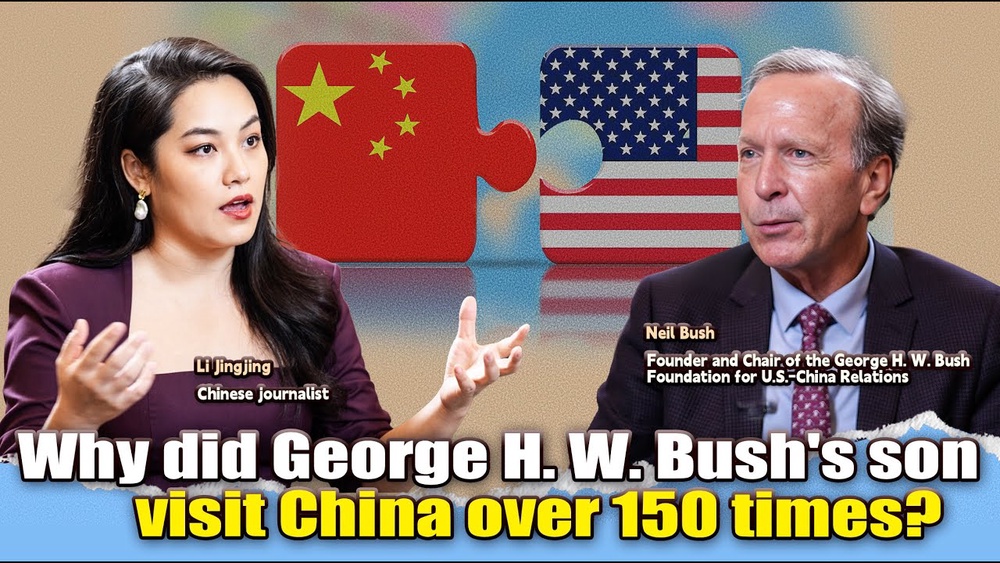
Malaysia's #1 Content Aggregator
Neil Bush Reflects on China’s Evolution and U.S.-China Relations: A Hopeful Outlook Despite Political Tensions
World
27 Sep 2024 • 8:30 AM MYT

Photo Credit: YouTube/LiJingJing
In an exclusive interview with Chinese Journalist Li Jing Jing, Neil Bush, son of former US President George H.W. Bush and brother of ex-President George W. Bush, shared his reflections on U.S.-China relations and his unique insights as the Founder and Chairman of the George H. W. Bush Foundation for U.S.-China Relations. Having visited China over 150 times since 1975, Bush provided a rare, nuanced perspective on China’s transformation over the past five decades.
Bush’s extensive experience with China began during the Cultural Revolution when he, as a 20-year-old, first encountered a nation drastically different from the one we see today. As he reminisced about China’s rise from a "poor bicycling country" to the world’s largest electric vehicle market, he emphasized how the Chinese system had worked for its people, lifting millions out of poverty and driving remarkable prosperity. He acknowledged that most Americans probably can’t even tolerate his viewpoints, but the Chinese system has worked for China. Bush argued that China’s governance had been highly beneficial to hundreds of millions of people whose prospects for prosperity were once bleak.
However, the conversation between Bush and Li took a more critical turn when they discussed current U.S.-China relations, which have hit a low point in recent years. Bush acknowledged the harsh rhetoric toward China, particularly in the U.S. political arena, where China is often portrayed as a threat. Both Democrats and Republicans have used this narrative, particularly in election cycles, painting China as responsible for job losses and unfair trade practices.
Yet, despite this strained relationship, Bush remains cautiously optimistic. “I don’t think things can get worse,” he said, recognizing the cyclical nature of political tensions. He expressed hope that after the U.S. elections, the aggressive anti-China rhetoric might subside, allowing for more rational discussions about the benefits of U.S.-China trade and collaboration. Bush is a firm believer that both economies can thrive through mutual engagement, noting that tariffs and trade restrictions have harmed both nations.
When discussing China’s military growth, Bush pushed back against the idea that China seeks to challenge the U.S. militarily. He believes that China’s military expansion, like that of any rising power, is primarily defensive and aimed at safeguarding its sovereignty rather than posing a threat to the U.S. He cited his father’s view, asserting that treating China as an enemy risks turning them into one, a move that would be catastrophic for both nations and the world.
Looking toward the future, Bush remains optimistic about China’s economic potential. Despite the setbacks from COVID-19 and ongoing geopolitical tensions, he believes that China’s vast population and innovative entrepreneurial spirit will help its economy rebound. However, he warned of potential challenges stemming from China’s aging population, which could impact its long-term productivity.
Throughout the interview, Bush emphasized the importance of dialogue and collaboration between the two superpowers. As Chairman of the Bush Foundation, he has facilitated various dialogues between American and Chinese politicians, military leaders, and businesspeople. He hopes that such initiatives will foster better understanding and reduce tensions.
Moving forward, Bush’s message is clear: while U.S.-China relations are currently at a low point, there is hope for improvement through dialogue, mutual respect, and cooperation. As someone who has witnessed China’s evolution firsthand, Bush sees the immense potential for the two nations to work together for the greater good of both their people and the world.
By: Kpost

the Chinese system has worked for China, all well and good for them.
ReplyDeleteJust stay the Fuck out of interfering with Malaysian waters
Ooop… what m'sia water?
DeleteDon't flush yr jamban soiled water everywhere, as u like!
https://t.me/WeTheMedia/108506
ReplyDeleteWhy do the Clintons have 5 shell companies in Delaware?
The state of Delaware has made itself a very comfy home for corporations to legally domicile themselves. But another component of Delaware’s legal system for registering and governing corporations is its lack of transparency compared to other states. Owners of companies registered in Delaware can remain anonymous.
Among 285,000 shell companies (with no operations at all in Delaware):
Hillary and Bill Clinton quietly set up two shell companies listed at “1209 North Orange Street” in 2008 and 2013. The names of the companies, but not their location, were first made public in tax filings released by Hillary Clinton in 2015.
▪️ One of the Clintons’ “1209 North Orange Street” companies is WJC, LLC, which was set up by Bill Clinton in 2008 as a pass-through for his consulting fees.
The “1209 North Orange Street” building is the headquarters for the Corporation Trust Company. The firm acts as a registered agent for thousands of corporations that are not actually located in Delaware, including the Clintons’ companies.
▪️ Another company at the same location, ZFS Holdings, LLC, was set up in February 2013, one week after Hillary Clinton left the State Department. Hillary Clinton received $5.5 million from her book publisher, Simon & Schuster, through the company.
In addition to the Clintons’ companies, their foundation also has three Delaware shell companies:
▪️ One is the Acceso Fund, LLC, which was registered by the Corporation Trust Company at 1209 North Orange Street in 2009. The Clinton Foundation has used the company to channel money to its Colombia-based private equity fund, Fondo Acceso.
The private equity fund, which is run out of the Clinton Foundation’s Bogota office, has invested in telecom and food processing companies in Colombia.
▪️ Another Clinton Foundation company, Acceso Worldwide Fund, Inc., was registered in 2013 by the Corporation Services Company, located in Wilmington, Delaware.
▪️ A third company, the Haiti Development Fund, LLC, was registered in 2010 by National Corporate Research, Ltd, located in Dover.
In Delaware, limited liability companies such as WJC, LLC, and ZFS, LLC, are not required to file annual statements disclosing their directors or owners. The Clintons also registered both companies in New York after they were established.
Hillary should be asked why she and her foundation are hiding behind Delaware’s secrecy laws. But of course, she grants interviews only to friendly journalists political operatives with bylines.
Subscribe to American Thinker
Seems like the wind is whispering that something big is going to happen in holly weird... hope no one suffers meltdown over hollyweird disintegration.
ReplyDeleteCurrent pointer to that possibility is the rap music equvalent to Jeffrey Epstein, Sean "Diddy" Comb, currently in custody.
~~~~~
https://t.me/professor_patriot_official/25604
Ellen DeGeneres has just released a statement announcing a “triple diagnosis”.
She says she could “disintegrate in the shower”.
Please do.
Interesting timing. Nothing like pandering for sympathy just when some looming “freak off” videos are about to drop.
You’re selling something nobody’s buying, Ellen.
Tick tock.
https://nypost.com/2024/09/27/entertainment/ellen-degeneres-diagnosed-with-osteoporosis-ocd-and-adhd/
https://t.me/professor_patriot_official/25080
Those Stephen Baldwin videos making more sense yet? He’s been hinting it was coming before the first time Diddy was raided. He’s victim Justin Bieber’s father in law after all.
Hollywood is going down🔥
https://t.me/professor_patriot_official/25556
https://t.me/redpillpharmacist/51341
‘Member last night when I posted about Ellen Degenerate and Diddy planning a party?
They are close and she is a horror.
There's video in the post. I did not watched it. I shared only for the text of the post. Speculation point to another rap mogul, maybe two, that are higher the chain of intensity and wickedness...I have seen some images that at best not seen...but you decide if you want to.
DeleteRegards.
~~~~~
https://t.me/professor_patriot_official/25636
This one comes with a warning. It’s a very tough watch and I hesitated to post it. But the whole point of this movement is to shine a light on the darkness and expose the evildoers.
The Diddy parties were far worse than we could have imagined.
Children were trafficked and CHILD PROTECTIVE SERVICES was the main supplier.
Pray for the children. There aren’t enough millstones.
https://t.me/professor_patriot_official/25637
DeleteOversight for Child Protective Services is handled by Department of Health and Human Services.
Of course that Department is run by a man named Dick Levine who has a sexual fetish of dressing in womens clothing.
Ghoul.
The following are for info. There are more of such kind of posting, in the same channels and other individual social media channels.
DeleteWhat I sense from this is that, being an on-going psyop, is to let people see that, even without all these supposedly large government agencies, the people can come together to sort things out. Which also means, the big gov agencies are not really needed, and can be reduced, so that potentially, when the legitimate and people actual representatives are in power and do reduce the size of the gov, there is support.
Cannot be that clearcut for the Dem in power, cannot help but can help foreign countries, and all these being the incumbent in an election year just a month away. Anecdote report through social media are showing people, who don't care about politics, are waking up.
Suspect more of these terrible incidents are coming in Oct to let people see for themselves before the election.
Anyway, this is just a guess, will see what will happen.
~~~~~
https://t.me/WeTheMedia/108752
President Trump has launched the below @GoFundMe campaign as an official response for MAGA supporters to offer their financial assistance to their fellow Americans impacted by Hurricane Helene. This is the ONLY one affiliated with @TeamTrump
👉DONATE👈
🐥- Dan Scavino Jr
https://t.me/professor_patriot_official/25799
I like Corey. We nothing in the form of status updates from the Biden administration, but Trump and Maga people involved are keeping us posted continually
https://fxtwitter.com/CoryMillsFL/status/1840936597497201149?s=09
Just appear after I posted the last comment...
Delete~~~~~
https://t.me/professor_patriot_official/25801
This lady is saying the exact same thing I said earlier. I'm reposting this on X. Need it viral. I don't disagree with anything she said. Some will never reached.
https://fxtwitter.com/TONYxTWO/status/1840917938087362743?s=09
Share as is. Notable. Similar to what had happened during the huge fire in one of the Hawaii'an islands. Mainly ancestral land got taken post fire, allegedly coveted as ocean beachfront for the uber rich.
DeleteAlso, the fire victims of Hawaii got few hundreds as aid in comparison to thr hundreds of billions being send to UA back then.
~~~~~
https://x.com/Lisahudsonchow7/status/1840900052790939836?t=yltcLQb7J5J_zApc_Rgtsg&s=09
Here’s a hypothetical … If the farmers and homeowners in NC wouldn’t sell their land to Piedmont Lithium, I wonder what could be done to incentivize them to sell? These people are sitting on lithium which is worth billions. Maybe a flood from a hurricane that didn’t seen like a normal hurricane? Do you think losing everything they own would make them sell?
It still looks a lot like Lahaina to me. They wanted it, and they took it.
Thoughts?
Neil Bush , son of Bush 41 and brother of Bush 43 was the notorious equivalent of "Hunter Biden" during the Bush years.
ReplyDeletePlying his family name and connections for business profit.
His most infamous business deals involved getting into bed with China's "Red and Rich" - the Ultra wealthy 2nd and 3rd generation scions of top CCP Party elites.
Mfer, shows solid proofs. Don't just fart with 台毒 lies topped with yr twisted imagination!
Delete